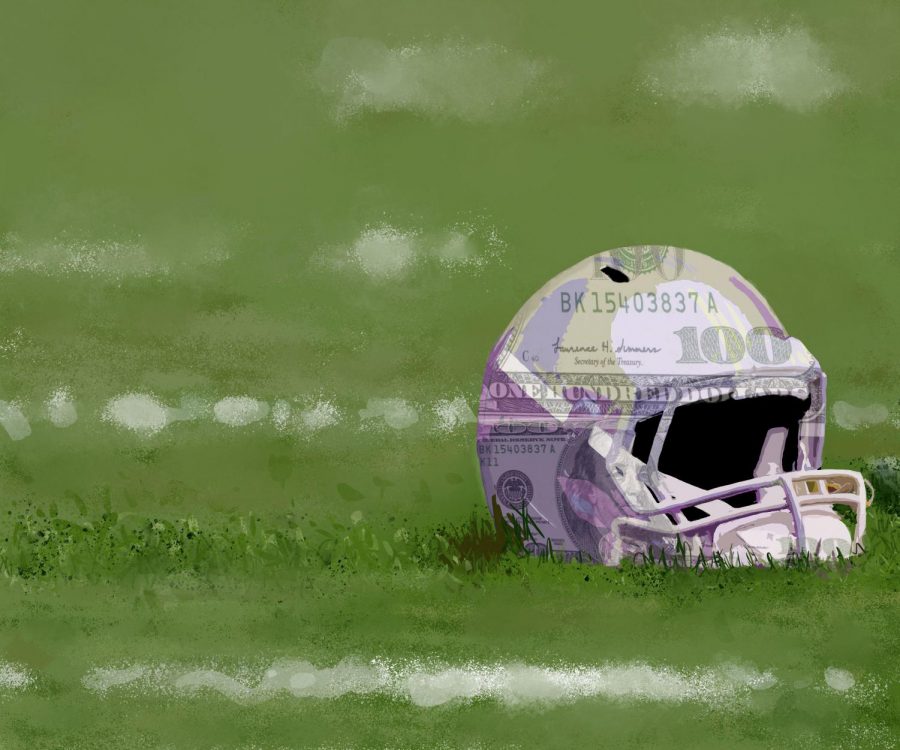College Athletes: Do They Deserve a Salary?
SHOULD THEY BE PAID? Surrounding college athletics is a constant debate, particularly in football, regarding the athletes themselves. Should college athletes be paid? Or should they continue to be pleased with where they are financially on scholarship?
October 15, 2018
Many families treat college football as a religion; every time their favorite team plays, the whole family sits down together, decked out in all of their best spirit gear, to watch a bunch of college students tackle each other. They enjoy the thrill of knowing their school came out on top, and that they can walk into school or work the next day and brag about how well their quarterback threw the ball, or how their team jumped up a spot in the national rankings.
Several colleges are even considered “football schools,” including Alabama, Ohio State, and Oklahoma, which dominate college football in America. Over the years, these schools have developed their football programs to become some of the best in the nation, bringing in sponsorship deals, Heisman-winning athletes and a large number of lifelong fans, some of whom never actually attended the university they have been supporting. Sophomore Grace LaFramboise, when asked what sports she watched, said, “My family and I watch college football every weekend: it’s a family tradition.” Parents, aunts and uncles leave their mark on their children by raising them to thrive in the working world, and also passing on their collegiate traditions. Family ties are broken or become stronger over college sports, particularly college football.
There are some people who do not even support a professional team, and would prefer watching and talking about a bunch of 20 year olds playing football at the same time that they are in school. Some ask why these athletes are not getting paid for their hard work, as they are training as much as professional athletes, while also taking classes to become a professional in whatever career they choose. Others believe that collegiate athletes are privileged enough with the scholarship money they get from their school, and they do not deserve any extra profits. They are getting the money they deserve from scholarship, and there is no reason why they should get profits for having the opportunities they have, as many college athletes will not end up becoming professionals in their sports.
Many forget that these college athletes prioritize academics over athletics. Although some of these athletes are going to become professionals in the sport that they play, that number is much lower than the number of college athletes in that sport. Many Division 1 athletes are getting at least a partial scholarship to play football for their college, excluding normal merit scholarship and academic scholarships. These athletes are already ahead of the game, many leaving college soon to be or already debt free heading into the professional world, which many college students do not have the luxury of. Junior Alex Amedson admitted that “college athletes are privileged with the amount of scholarship they get, but there are times when [athletes] should get more than scholarship money.”
People will often bring up the idea of how college athletes are making lots of revenue for their universities, particularly from their name, the broadcasting of games and sponsorship deals universities can gain from the talent of their athletes. Hearing about the amount of time Division 1 athletes put into their training was a swaying factor for some, including freshman Dane Hansen. When Hansen was told about the amount of time college football players put in at the top level, he was surprised. “I do believe that college athletes should get paid, especially if they are working and training the same amount as professionals or close to it,” he said. College athletes spend almost 40 hours a week on training for their sports, either in the weight room, on the field, or watching videos of their future opponents.
The disparity in training time between Division 1 and Division 3 athletics is immense, especially considering the fact that Division 3 athletics cannot receive any form of athletic scholarship. According to an article in Prep Scholar on NCAA divisions, Division 3 athletes, “There are shorter practice hours and less travel for games in D III. In Division III, the emphasis is on the value of competing in sports to the participant. There is less of a focus on generating revenue or creating events for spectators.” Division 1 athletics are much more revenue focused than Division 3, as they have a higher opportunity of gaining sponsorship deals, and making a lot of money off of their players’ names and numbers.
Senior Jack Higgins was of another opinion to most. He believed that, “College athletes are already immensely privileged for the amount of scholarship money they receive, and if they should get more of a reward it should only be in the form of more scholarship money. There should be no profit for college athletes.” This is a common argument in response to those who think college athletes should get paid. Those in opposition to a salary for these players often talk about how grateful they should be for the position they are in, including freshman Eryn Cooper, who when asked about whether or not college athletes should get paid stated, “Athletes should be happy with the amount of scholarships they get from their school, as they are students before athletes.”
The argument over possibly giving a salary to college athletes is a much debated topic, and one which should be talked about more often than it is. People constantly return to the idea of a salary for college athletes, and people start to wonder about the idea of paying athletes at the collegiate level. Should college athletes be getting paid?




